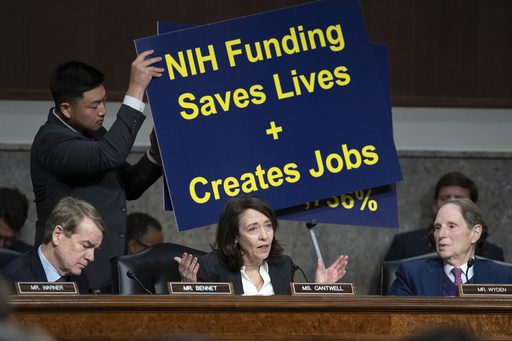
In a notable turn of events, Robert F. Kennedy Jr. has officially taken on the role of Secretary of Health and Human Services under President Donald Trump, following a narrow Senate vote that concluded with a tally of 52-48. This decision has placed Kennedy, known for his skeptical stance on vaccines, in charge of a vast $1.7 trillion federal budget that encompasses health insurance programs affecting a significant portion of the population, as well as food safety regulations and vaccine recommendations.
Despite some concerns among Republicans regarding Kennedy’s vaccine views, the majority aligned with Trump to secure his appointment. Only Kentucky Senator Mitch McConnell voted against Kennedy, mirroring his previous positions on Trump’s other cabinet selections. McConnell articulated his stance, citing personal experiences from surviving polio, emphasizing the critical importance of vaccines and their proven efficacy in saving lives worldwide.
On the other hand, the broader GOP expressed enthusiasm for Kennedy’s leadership and his directive aimed at addressing chronic health issues, such as obesity. Senator Mike Crapo from Idaho remarked that Kennedy brings a refreshing perspective that could aid in fostering a healthier America.
The swearing-in ceremony took place at the Oval Office, presided over by Supreme Court Justice Neil Gorsuch, with Kennedy’s family and several congressional members present. Recalling his childhood visit to the Oval Office in 1961, Kennedy reminisced about moments spent there with his uncle, former President John F. Kennedy.
Trump has tasked Kennedy with leading a new initiative aimed at enhancing American health, and Kennedy expressed gratitude for Trump’s influence in both his personal and professional life, labeling him a “pivotal historical figure.” Over the years, Kennedy has built a substantial following, particularly during the COVID-19 pandemic, due to his controversial views on health topics, including vaccines and chemicals.
His anti-vaccine activism intensified during the health crisis, as he utilized a nonprofit organization to initiate legal actions against vaccine manufacturers and challenge public confidence in vaccinations and the institutions promoting them. With Trump’s endorsement, Kennedy is optimistic about restoring public trust in crucial health agencies such as the FDA, CDC, and NIH.
Senator Thom Tillis from North Carolina expressed hopes that Kennedy would take robust action to tackle rising health care expenses and improve overall health outcomes for Americans. However, prior to lending his support, Republican Senator Bill Cassidy from Louisiana sought assurances regarding the preservation of existing vaccine guidelines.
Throughout the Senate hearings, lawmakers probed Kennedy on several contentious topics, including the debunked correlation between vaccines and autism, alongside concerns regarding potential financial conflicts of interest tied to his vaccine-related endeavors. Kennedy reportedly earned over $850,000 from a referral arrangement with a law firm involved in lawsuits against the HPV vaccine Gardasil. He assured that, if confirmed, he would redirect any fees associated with this arrangement to his son.
Kennedy steps into this pivotal role amid significant upheaval within the federal government’s structure, particularly disruption fueled by billionaire Elon Musk, which has temporarily stalled billions in public health funding and created uncertainties for numerous federal employees.
Recently, the NIH announced it would limit funding for medical research at universities, particularly in areas like cancer treatment development, which further complicates the landscape. In alignment with his prior statements, Kennedy has suggested a significant revamp of staff at the NIH, FDA, and CDC, previously indicating intentions to dismiss around 600 employees from the NIH, the leading agency for funding biomedical research in the country.

